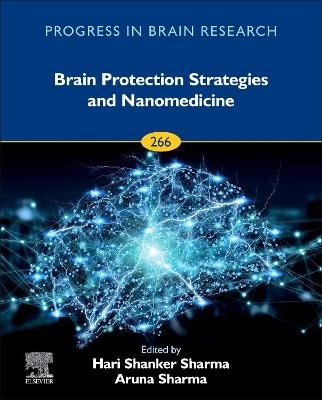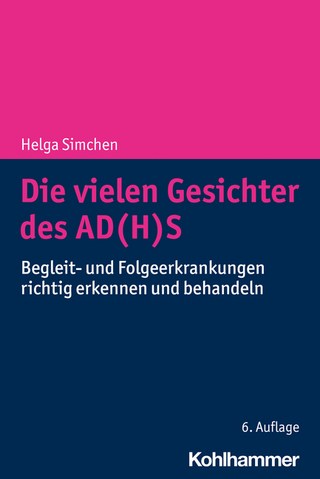
Brain Protection Strategies and Nanomedicine
Elsevier - Health Sciences Division (Verlag)
978-0-323-98927-5 (ISBN)
- Titel z.Zt. nicht lieferbar
- Versandkostenfrei innerhalb Deutschlands
- Auch auf Rechnung
- Verfügbarkeit in der Filiale vor Ort prüfen
- Artikel merken
Other chapters cover how Methamphetamine exacerbates pathophysiology of traumatic brain injury at high altitude: Neuroprotective effects of nanodelivery of a potent antioxidant compound H-290/51, Effectiveness of bortezomib and temozolomide for eradication of recurrent human glioblastoma cells, resistant to radiation, and more.
Dr. Hari Shanker Sharma, Professor of Neurobiology (MRC), Docent in Neuroanatomy (UU) is currently working in Uppsala University Hospital, Department of Surgical Sciences, Division of Anesthesiology & Intensive Care Medicine, Uppsala University, Sweden. Dr Sharma obtained his Masters Degree from Bihar University with special expertise in Cell Biology in 1976 and was awarded the Gold Medal of Bihar University for securing 1st position in the 1st Class. Dr Sharma joined the group of Professor Prasanta Kumar Dey, a neurophysiologist, by training in the Department of Physiology, Institute of Medical; Sciences, Banaras Hindu University, Varanasi in 1977 to obtain his Doctor of Philosophy Degree (D.Phil.) in Neurosciences and was awarded his Ph.D. in 1982 on “Blood-Brain Barrier in Stress. After carrying out a series of Government of India funded Research Projects on the BBB and brain dysfunction (1982–1987), Dr Sharma joined the lab of Neuropathology at Uppsala University with Professor Yngve Olsson in 1988 to investigate passage of tracer transport across the BBB caused by stress or traumatic insults to the Brain and Spinal cord at light and electron microscopy. Dr Sharma was awarded the prestigious Alexander von Humboldt Foundation Fellowship of German Government (1989–1991) to work on hyperthermia induced BBB dysfunction at the ultrastructural level in the laboratory of Professor Jorge Cervós-Navarro (a living “Legend in Neuropathology in Europe). Dr Sharma again joined Uppsala University and established a network of collaboration on “Experimental CNS Injury Research Group as a lead investigator with eminent collaborators in various parts of Europe, USA, and Australia (1991–). On his work on hyperthermia Dr Sharma received the prestigious Neuroanatomy award “Rönnows Research prize of Uppsala University for “best neuroanatomical research of the year 1996 followed by the Award of the Degree of Doctor of Medical Sciences of Uppsala University in Neuroanatomy in 1999 and selected for the Best Thesis Award of the Medical faculty, “The Hwassers Prize of 1999. On his meticulous works on the Blood Brain barrier and Brain edema (2000–2003) Dr. Sharma earned the prestigious title of “Docent in Neuroanatomy of Medical Faculty, Uppsala University in April 2004. Currently his main research interest is Neuroprotection and Neuroregeneration, in relation to the Blood-brain barrier in stress, trauma, and drugs of abuse in health and disease. Dr. Sharma on his research on brain pathology and neuroprotection in different models received the prestigious award from The Laerdal Foundation of Acute Medicine, Stavanger, Norway, in 2005 followed by Distinguished International Scientists Collaboration Award by National Institute on Drug Abuse (NIDA), Baltimore, MD (2006–2008). His recent work on 5-HT3 receptor mediated neuroprotection in morphine withdrawal induced neurotoxicity won the coveted prize of Best Investigator Award 2008 and Best Scientific Presentation by European Federation of the International Association for Study of Pain (ISAP), and Awarded during their VI Annual Meeting in Lisbon, September 9–12, 2008. His recent research is aimed to find out the role of nanoparticles in Neurodegeneration and Neuroprotection using various treatment strategies that is supported by European Aerospace Research and Development (EOARD), London, UK and US Air Force Research Laboratory, Wright Patterson Air Force Base, Dayton, Oh, USA. On his works on Blood–brain barrier in hypertension and diabetes together with Romanian colleagues, University of Medicine and Pharmacy “Iuliu Hatieganu, Cluj-Napoca, Romania awarded Dr. Sharma with Honorary Doctorate of Medical Sciences in 2009. Dr Sharma’s work over 30 years on the blood-brain barrier and brain edema won him the US Neurosurgeon Dr Anthony Marmarou Award (2011) by the International Brain Edema Society at their 15th Congress in Tokyo, Japan, November 2011. His works on Nanoneuroscience and development of nanomedicine to treat the CNS injuries has won accolades at various Government and International Scotties or Organization across the World. Accordingly Dr Sharma was decorated with the most prestigious Hind Rattan Award 2012 on the eve of Republic Day of India in January 2012 and Mahatma Gandhi Pravasi Gold Medal in October 2012 in House of Lords, London, UK. Dr Sharma was also invited to organize and chair Nanosymposium in Society for Neuroscience meetings in Chicago (2009), San Diego (2010), Washington DC (2011) and New Orleans (2012). Dr Sharma has published over 380 research papers, 75 reviews, 12 monographs, and 70 international book chapters and edited 15 book volumes. Aruna Sharma, MD is currently Secretary of Research at Uppsala University Hospital, Uppsala University, Sweden. She obtained her Bachelor of Science in 1971 and trained in Indian Medicine up to 1977 and engaged in medical research from 1978 to 1986 in India on hyperthermia induced brain dysfunction in the lab of Hari Sharma and Prasanta Kumar Dey under University Grants Commission and Indian Council of Medical Research Her main interest is now focused on Indian Medicinal drugs and their effects on the Central Nervous System Function, toxicology, neurorepair and neuroprotection. She is also investigating neurotoxicological profiles of many Ayurvedic traditional drugs with special reference to those containing metal oxide or metal ashes.
1. Histamine H3 and H4 receptors modulate Parkinson’s disease induced brain pathology. Neuroprotective effects of nanowired BF-2649 and clobenpropit with anti-histamine-antibody therapy Aruna Sharma, Dafin F Muresanu, Ranjana Patnaik, Preeti K Menon, Z Ryan Tian, Seaab Sahib, Rudy J Castellani, Ala Nozari, JosŽ Vicente Lafuente, Anca D. Buzoianu, Stephen D Skaper, Igor Bryukhovetskiy, Igor Manzhulo, Lars Wiklund, Hari Shanker Sharma 2. Ultra Early Molecular Biologic Diagnosis Of Malignant And Neurodegenerative Diseases By The Immunospecific Profiles Of The Proteins Markers Of The Surface Of The Mobilized Autologous Hematopoietic Stem Cells Andrey S. Bryukhovetskiy, Lyudmila Y. Grivtsova, Hari Shanker Sharma 3. Neuroprotective effects of Insulin like growth factor-1 on Engineered metal Nanoparticles Ag, Cu and Al induced blood-brain barrier breakdown, edema formation, oxidative stress, upregulation of neuronal nitric oxide synthase and brain pathology Hari Shanker Sharma, JosŽ Vicente Lafuente, Dafin F Muresanu, Seaab Sahib, Z Ryan Tian, Preeti K Menon, Rudy J Castellani, Ala Nozari, Anca D. Buzoianu, Per-Ove Sjšquist, Ranjana Patnaik, Lars Wiklund, Aruna Sharma 4. Methamphetamine exacerbates pathophysiology of traumatic brain injury at high altitude. Neuroprotective effects of nanodelivery of a potent antioxidant compound H-290/51 Hari Shanker Sharma, JosŽ Vicente Lafuente, Lianyuan Feng, Dafin F Muresanu, Preeti K Menon, Rudy J Castellani, Ala Nozari, Seaab Sahib, Z Ryan Tian, Anca D. Buzoianu, Per-Ove Sjšquist, Ranjana Patnaik, Lars Wiklund, Aruna Sharma 5. Effectiveness of bortezomib and temozolomide for eradication of recurrent human glioblastoma cells, resistant to radiation Oleg Pak, Sergei Zaitsev, Valery Shevchenko, Aruna Sharma, Hari Sharma and Igor Bryukhovetskiy 6. Cerebrolysin restores balance between excitatory and inhibitory Amino Acids in brain following Concussive Head Injury. Superior Neuroprotective effects of TiO2 nanowired drug delivery Hari Shanker Sharma, Dafin F Muresanu, Seaab Sahib, Z Ryan Tian, JosŽ Vicente Lafuente, Anca D. Buzoianu, Rudy J Castellani, Ala Nozari, Cong Li, Zhiquiang Zhang, Lars Wiklund, Aruna Sharma 7. Neuromodulation as a basic platform for neuroprotection and repair after spinal cord injury Artur Biktimirov, Oleg Pak, Igor Bryukhovetskiy, Aruna Sharma and Hari Shanker Sharma 8. Superior antioxidant and anti-ischemic neuroprotective effects of Cerebrolysin in heat stroke following intoxication of Engineered metal Ag and Cu nanoparticles. A comparative biochemical and physiological study with other stroke therapies Hari Shanker Sharma, Dafin F Muresanu, Asya Ozkizilcik, Seaab Sahib, Z Ryan Tian, JosZ Vicente Lafuente, Rudy J Castellani, Ala Nozari, Lianyuan Feng, Anca D. Buzoianu, Preeti K Menon, Ranjana Patnaik, Lars Wiklund, Aruna Sharma 9. A Clinical Study of High-dose Urokinase Treatment for Hypertension Induced Ventricular Hemorrhage He Chao, Gang Yang, Wei Wang, Qilin Wu, Wang Lin, Hari Shanker Sharma 10. Topical application of CNTF, GDNF and BDNF in combination attenuates blood-spinal cord barrier permeability, edema formation, hemeoxygenase-2 upregulation, and cord pathology Aruna Sharma, Lianyuan Feng, Dafin F Muresanu, Hongyun Huang, Preeti K Menon, Seaab Sahib, Z Ryan Tian, JosŽ Vicente Lafuente, Anca D. Buzoianu8, Rudy J Castellani, Ala Nozari, Lars Wiklund, Hari Shanker Sharma 11. Diagnosis Experience and Literature Review of Patients with Cervical, Thoracic and Lumbar Multisegment Spinal Stenosis: a case report He Chao, Xu Longbiao, Zhao Ming, Wang Lin, Hari Shanker Sharma
| Erscheinungsdatum | 18.10.2021 |
|---|---|
| Reihe/Serie | Progress in Brain Research |
| Verlagsort | Philadelphia |
| Sprache | englisch |
| Maße | 191 x 235 mm |
| Gewicht | 1000 g |
| Themenwelt | Geisteswissenschaften ► Psychologie ► Biopsychologie / Neurowissenschaften |
| Naturwissenschaften ► Biologie ► Humanbiologie | |
| Naturwissenschaften ► Biologie ► Zoologie | |
| ISBN-10 | 0-323-98927-6 / 0323989276 |
| ISBN-13 | 978-0-323-98927-5 / 9780323989275 |
| Zustand | Neuware |
| Haben Sie eine Frage zum Produkt? |
aus dem Bereich


